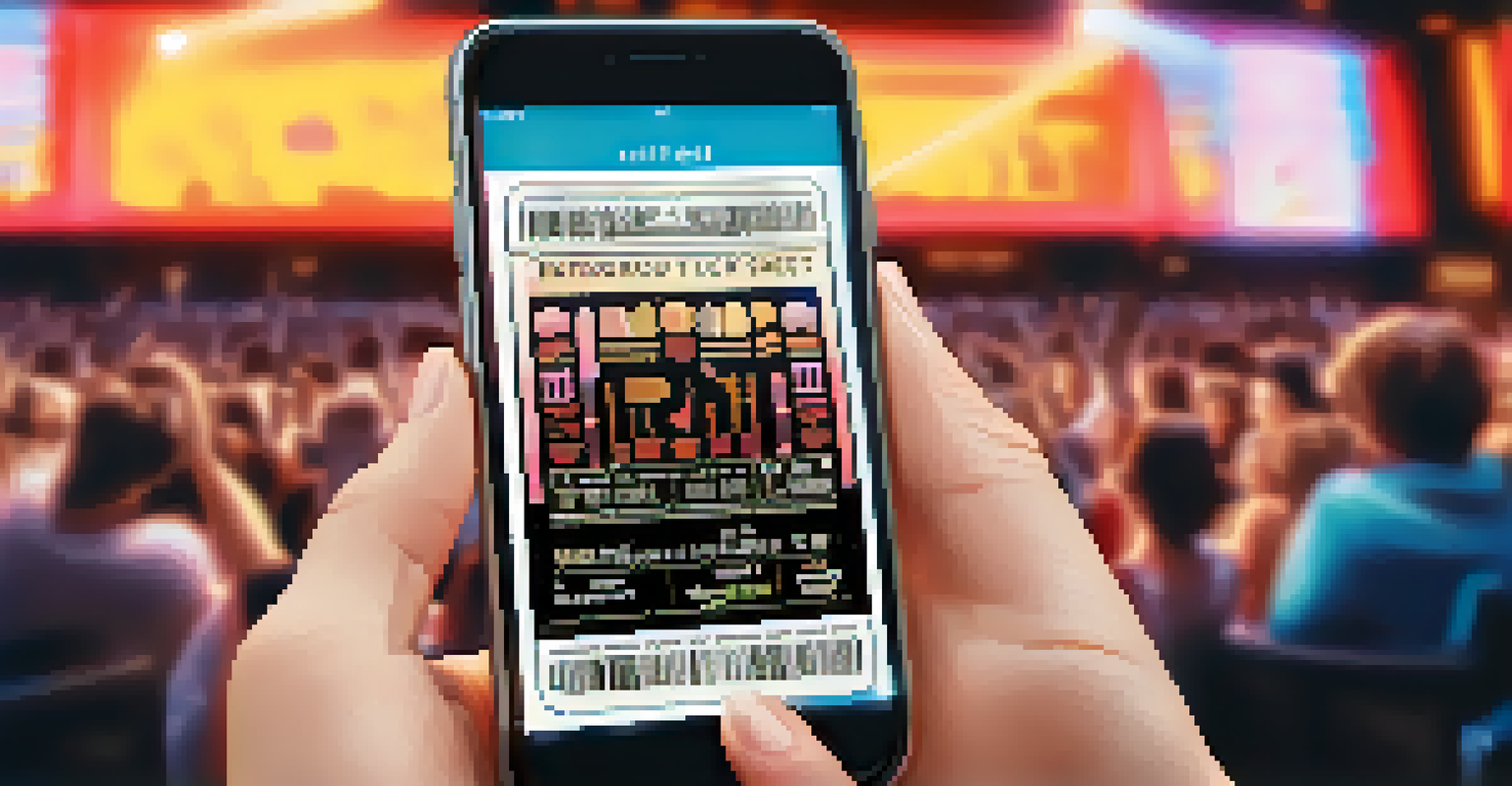The Future of Ticketing: Blockchain in Live Events

Understanding Blockchain Technology in Ticketing
Blockchain is a decentralized digital ledger that records transactions across multiple computers. This technology is best known for its role in cryptocurrencies like Bitcoin, but its potential goes far beyond that. In ticketing, blockchain can provide a secure way to track tickets from the moment they are purchased until they reach the event.
Blockchain technology is not just a trend; it’s a revolution that will reshape the way we conduct transactions, including ticketing.
Imagine a world where every ticket is uniquely identified and traceable, reducing the risk of fraud and scalping. Each transaction is securely recorded on the blockchain, making it nearly impossible to forge or duplicate tickets. This level of transparency can foster trust among consumers and event organizers alike.
As we delve deeper into the future of ticketing, understanding the basics of blockchain will help us appreciate its transformative potential. This technology promises not only to enhance security but also to streamline the ticketing process, making events more accessible for everyone.
Benefits of Blockchain in Live Event Ticketing
One of the standout benefits of using blockchain for ticketing is enhanced security. With traditional ticketing systems, counterfeit tickets can easily slip through the cracks, leading to financial losses and disappointed fans. Blockchain eliminates this risk by ensuring that each ticket's authenticity can be verified instantly.

Additionally, blockchain can help reduce ticket prices for consumers. By cutting out middlemen and allowing direct transactions between buyers and sellers, event organizers can offer tickets at more competitive prices. This not only benefits consumers but also gives event organizers greater control over pricing.
Blockchain Enhances Ticket Security
Blockchain technology provides a secure way to verify ticket authenticity, significantly reducing the risk of fraud and counterfeiting.
Moreover, blockchain technology can create a more equitable distribution of tickets. Through smart contracts, tickets can be allocated fairly, ensuring that genuine fans have a better chance of attending their favorite events. This could significantly reduce the frustration often associated with ticket purchasing.
How Blockchain Prevents Ticket Scalping
Ticket scalping, the practice of reselling tickets at inflated prices, has long plagued the live event industry. Blockchain technology can combat this issue by allowing event organizers to set rules and limits on ticket transfers. This means that tickets can only be resold at face value or within a controlled price range.
The future of ticketing is not just about securing transactions; it's about creating a seamless experience for fans.
By utilizing blockchain, organizers can easily track ticket ownership and transfer history, which makes it more challenging for scalpers to operate. For instance, if a ticket is resold, the system can ensure that the original price remains intact, protecting fans from exorbitant markups.
This not only protects consumers but also enhances the overall experience of attending live events. By reducing scalping, more fans can access tickets at reasonable prices, creating a more vibrant and engaged audience.
Smart Contracts: The Future of Ticketing Agreements
Smart contracts are self-executing contracts with the terms of the agreement directly written into code. In the realm of ticketing, they can automate various processes, such as payments and ticket transfers, which reduces administrative overhead. This means that once a ticket is purchased, the transaction is recorded and executed without the need for intermediaries.
Imagine buying a ticket for a concert, and as soon as your payment is made, the smart contract automatically issues your ticket to your digital wallet. This seamless experience not only enhances user satisfaction but also ensures that the entire process is secure and transparent.
Smart Contracts Streamline Processes
Smart contracts automate ticket transactions, eliminating the need for intermediaries and creating a seamless purchasing experience.
Smart contracts can also facilitate secondary sales, allowing fans to sell tickets they can no longer use while ensuring that the original seller receives a percentage of the resale profit. This creates an ecosystem where everyone benefits, from the original event organizer to the fans.
The Role of NFTs in Ticketing
Non-fungible tokens (NFTs) are unique digital assets that can represent ownership of a specific item or experience, including event tickets. Unlike traditional tickets, NFTs can offer additional value through their unique digital signatures. This can include perks such as exclusive access to backstage areas or meet-and-greet opportunities.
By combining blockchain technology with NFTs, event organizers can create a more engaging experience for fans. Each NFT ticket can carry additional content, like digital memorabilia or exclusive content from the event, enhancing the overall value of the ticket.
Moreover, NFTs can be programmed to retain value after the event, allowing fans to resell or trade them in the future. This not only benefits the fans but also adds a layer of collectability to the ticketing process.
Challenges Facing Blockchain in Ticketing
Despite its numerous advantages, implementing blockchain technology in ticketing is not without challenges. One significant hurdle is the need for widespread adoption. For blockchain-based ticketing to be effective, a critical mass of event organizers and consumers must embrace the technology and its benefits.
Additionally, there are concerns regarding the environmental impact of blockchain technologies, particularly those that rely on energy-intensive processes like mining. As the industry moves forward, finding energy-efficient solutions will be crucial to address these concerns while still reaping the benefits of blockchain.
NFTs Add Value to Event Tickets
Non-fungible tokens (NFTs) allow for unique digital ownership of tickets, offering added perks and future resale potential for fans.
Finally, regulatory issues may arise as governments and organizations seek to understand and regulate this new form of ticketing. Navigating these legal landscapes will be essential for the successful integration of blockchain in live events.
The Future Outlook for Blockchain Ticketing
As technology continues to evolve, the future of ticketing looks promising with blockchain at the forefront. Event organizers are increasingly recognizing the potential of blockchain to enhance security, reduce fraud, and improve customer experience. This shift could lead to a more transparent and efficient ticketing ecosystem.
We may also witness an increase in partnerships between event organizers and tech companies specializing in blockchain solutions. These collaborations could drive innovation, resulting in more robust ticketing platforms that offer unique features and improve user experience.

Ultimately, the integration of blockchain technology in ticketing is a step toward a more equitable and enjoyable live event experience. As we look ahead, the possibilities are endless, and it will be exciting to see how this technology transforms the way we experience events.